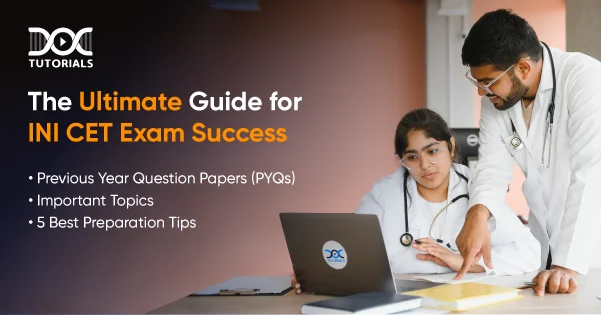MS vs MD: Choose the Right Path for You After MBBS

Every medical aspirant wants to pursue postgraduate degrees after completing their MBBS for a promising career. In this regard, MD (Doctor of Medicine) and MS (Master of Surgery) degrees have their own benefits and challenges that can influence your decision.
Are you confused about choosing between an MD and an MS after completing an MBBS? Deciding the right career path involves a series of considerations and a deep understanding of your skills and specialisation.
So, it is necessary to understand the difference between MS and MD and their opportunities, prospects, etc., to choose one that best aligns with your career aspirations. Read on for a detailed overview of both MD and MS to make informed decisions!
MD vs MS: Key Differences
Both MD and MS are postgraduate medical courses with the following differences:
| MD (Doctor of Medicine) | MS (Master of Surgery) |
| It involves developing abilities such as patient diagnosis and offering adequate treatment. | It offers a detailed knowledge of surgical procedures, including clinical discussions, patient care, and supervised surgery. |
| Specialisations in MD include general medicine, neurology, paediatrics, dermatology, and radiology. | Specialisations in MS include general surgery, gynaecology, vascular surgery, neurosurgery, and urology. |
Differences Between MS and MD Based on Course Structure
Here are the basic course details to understand the differences between MS and MD better:
| Parameters | Master of Surgery | Doctor of Medicine |
| Eligibility Criteria | You need to score at least 50% marks in MBBS undergraduate and also clear NEET PG to pursue a Master of Surgery. | You need to score at least 50% marks in MBBS undergraduate, besides clearing the NEET PG examination. |
| Fees | ₹8,00,000 – ₹20,00,000 annually | ₹4,00,000 – ₹20,00,000 annually |
| Course Duration | 3 Years | 2-3 Years |
| Scopes of Higher Studies | M.Ch in any specialisation | PhD in Medicine |
| Entrance Examination | NEET PG, JIPMER- PG | NEET PG |
| Career Options | Home Surgeon, Plastic Surgeon, Cardiologist, Oncologist, Emergency Surgeon, etc. | Pathologist, Paediatrician, Physician, Radiologist, Obstetrician, etc. |
Prepare for your NEET PG with DocTutorials and confidently pursue your chosen career!
Check out the NEET PG 2025 syllabus here.
MS (Master of Surgery): Definition and Overview
Master of Surgery, or MS, is a postgraduate degree that specialises in surgical procedures. In this PG program, you get training to perform different surgeries. It also deals with handling emergencies that require immediate physical intervention.
MS encompasses fields like neurosurgery, orthopaedics, and general surgery. Surgeons require exceptional instrument handling skills, steady hands, and precision to ensure successful surgical outcomes.
Master of Surgery: Advantages and Disadvantages
The benefits and limitations of a Master of Surgery are represented below:
| Pros of MS (Master of Surgery) Degree | Cons of MS (Master of Surgery) Degree |
| It encompasses medical interventions and technologies for certain specialities. | It may not be able to match the latest advancements in surgical technology. |
| You can get multiple opportunities to practice surgical procedures in clinics, private chambers, and hospitals. | Scopes in academia and research are few. |
| The competition in the MS field is lower than that in the MD. | Unpredictable and demanding working hours can affect your work-life balance. |
MD (Doctor of Medicine): Definition and Overview
A doctor of Medicine (MD) specialises in diagnosis and non-surgical treatment of diseases. It specialises in fields like cardiology, internal medicine, dermatology, and paediatrics.
Becoming an MD enables aspirants to diagnose conditions, suggest treatments, and monitor patient progress through follow-up care, providing comprehensive medical management without surgical interventions.
Doctor of Medicine: Advantages and Disadvantages
Take a look at the benefits and limitations of Doctor of Medicine:
| Pros of MD (Doctor of Medicine) Degree | Cons of MD (Doctor of Medicine) Degree |
| You can explore an extensive range of medical specialities. | The exposure to the surgical process is limited. |
| You get ample opportunities to teach and research in multiple medical specialities. | You cannot experience hands-on surgical procedures. |
| Predictable working hours with assurance of work-life balance, except for emergencies. | May have high competition in specific fields. |
The Need for PG Courses After an MBBS Degree
Pursuing a specialised degree after MBBS will help you acquire a specialisation in the medical field. Here are some more reasons why one aspires to take up specialised degrees:
- Career Opportunities
An MBBS graduate’s value increases with specialisation, leading to an upward career trajectory. While an MBBS degree makes one a physician, an MD or MS degree enables specialisation as a specialist or surgeon, respectively, enhancing professional growth and opportunities.
- Demand
MD and MS graduates are in higher demand due to their specialised expertise. Patients often prefer specialists over MBBS graduates, as they offer more focused care in specific medical fields.
- Salary
There is a significant salary disparity between MBBS and MD/MS graduates in India. MBBS graduates earn up to ₹1 lakh per month, MD specialists earn ₹4-20 lakh, and MS graduates earn ₹4-35 lakh monthly.
- Practicing Area
MD candidates can establish independent practices, become their own bosses, and earn substantial income by opening their clinics.
Career Prospects: MD vs MS Doctor
Career prospects for both MD and MS graduates are equally rewarding, depending on skills, experience, and specialisation. Both paths offer excellent opportunities, with success tied to individual aptitude and expertise.
While surgeons can treat non-surgical conditions due to their MBBS background, specialists like general physicians cannot perform surgery without additional training. Ultimately, both degrees provide strong career prospects, with career advancement dependent on the chosen specialisation and personal abilities.
Factors to Consider While Choosing Between MD and MS
Knowing the difference between MS and MD will help you make informed decisions while choosing one as your career. However, you must also consider the following things before finalising your decision:
- Your Field of Interest
Your personal interests play a crucial role in your success as a physician or surgeon. Consider whether you’re driven by performing surgical procedures or diagnosing and managing internal medicine to align your career with your passions.
- Proper Guidance
Seek advice from mentors, senior professionals, and peers to gain insights into your preferred career path. If possible, shadow a senior to experience firsthand what working in that field entails.
- Career Goals
The field you choose is going to impact your medical career in future. So, you need to decide whether you want to be a researcher, a teacher, a physician or a surgeon in your medical career. Besides, you should also consider the financial aspect when selecting a certain speciality.
FAQs About Choosing Between MS and MD
- Can I pursue both an MS and MD degree?
Being two different postgraduate courses, you can technically pursue both MS and MD degrees, but finishing one and then starting another can be time-consuming. Besides, continuing both courses together can be hectic as they include different syllabus structures.
- Which is the best career: MD or MS?
Choosing between MD and MS depends on your skills, interests, and aptitude. You can consider factors like career prospects and personal comfort. MS involves working with blood and tissue, while MD in general medicine focuses on prescribing medications and direct patient interaction.
- Can I perform surgery after pursuing an MD degree?
Though MDs are not specialised in performing surgery, they may perform some basic surgical procedures if their training and speciality permit.
- Which is challenging to pursue: MD or MS?
MD requires critical thinking and research skills, while MS demands hands-on practical skills. Both paths are technically challenging and require significant hard work and commitment.
- Do I need to clear only the NEET PG exam to enter MD and MS degree courses?
NEET PG is mandatory, but you can also appear for other exams, such as AIAPGET, JIPMER PG, NMIHANS PG, INI CET, etc., to study MD or MS courses.
- Which colleges in India offer the best MD and MS degree courses?
Maulana Azad Medical College, New Delhi, KMC Mangalore – Kasturba Medical College, St. Johns Medical College, Bangalore, MS Ramaiah Medical College, Bangalore, etc., are some of the best colleges for MD and MS courses.
Conclusion
Choosing between an MD and an MS after an MBBS depends on individual interests and career goals. Both paths offer rewarding opportunities but require careful consideration of skills and specialisation. Learning about the difference between MS and MD can help you make the right decision based on your specialty and aspirations.
If you want to get admission to one of the best medical colleges in India for MD or MS, you must pass the MBBS degree and NEET PG exam with flying colours. And this is possible when you have expert guidance like DocTutorials.
Our courses are designed with engaging live sessions, top-quality video lectures, and one-on-one interactions to ensure each aspirant receives the best guidance.
Get the best learning experience with DocTutorials!
Latest Blogs
-

NEET PG Exam 2025- Date, Pattern, Marking Scheme, Subject Wise Weightage, and Exam Mode
NEET PG Exam 2025 is the ultimate gateway for medical graduates aspiring to pursue postgraduate courses in medicine, including MD,…
-

INI CET Exam 2025: Your Roadmap to Success – Key Topics, Strategies, and Lessons from Last Year’s Papers
The INI CET exam is more than just a test; it’s a significant milestone for many medical students aiming to…
-

INI CET Exam Success: Previous Year Question Papers & Ultimate Guide – INI CET PYQ
One can feel overwhelmed while preparing for the INI CET (Institute of National Importance Combined Entrance Test). A vast syllabus,…





